Finish the program below that does several bitwise manipulat
Finish the program below that does several bit-wise manipulations of C integers.
Cut and paste the following:
Finish the Program!
You may only use the integer constants given at the beginning. (You may use whatever integers you wish in string constants as long as they are for printf()\'s. For example the format string \"0x%08X\" is useful for printing hexadecimal integers.)
You may only use the following integer operators:
+
-
++
--
<<
>>
~
|
&
<
>
=
!=
==
Sample output (32 bit):
Sample output (64 bit):
Solution
mm:
la $a3, array_A # base address for array_A loaded into $a3
la $a1, array_B # base address for array_B loaded into $a1
la $a2, array_C # base address for array_C loaded into $a2
li $t1, four # $t1 = four (row-size and loop end)
li $s0, zero # i = 0; initialize first for loop
loop1:
li $s1, zero # j = 0; restart 2d for loop
loop2:
li $s2, zero # k = 0; restart third for loop
sll $t2, $s0, two # $t2 = i * four (size of row of c)
addu $t2, $t2, $s1 # $t2 = i * size(row) + j
sll $t2, $t2, two # $t2 = computer memory unit offset of [i][j]
addu $t2, $a2, $t2 # $t2 = computer memory unit offset of [i][j]
lw $t4, 0($t2) # $t4 = two bytes of c[i][j]
loop3:
sll $t0, $s2, two # $t0 = k * four (size of row of b)
addu $t0, $t0, $s1 # $t0 = k * size(row) + j
sll $t0, $t0, two # $t0 = computer memory unit offset off [k][j]
addu $t0, $a1, $t0 # $t0 = computer memory unit address of b[k][j]
lw $t5, 0($t0) # $t5 = two bytes of b[k][j]
sll $t0, $s0, two # $t0 = i * four (size of row of a)
addu $t0, $t0, $s2 # $t0 = i * size(row) + k
sll $t0, $t0, two # $t0 = computer memory unit offset of [i][k]
addu $t0, $a3, $t0 # $t0 = computer memory unit address of a[i][k]
lw $t6, 0($t0) # $t6 = two bytes of a[i][k]
mul $t5, $t6, $t5 # $t5 = a[i][k] * b[k][j]
add $t4, $t4, $t5 # $t4 = c[i][j] + a[i][k] * b[k][j]
addiu $s2, $s2, one # $k = k + one
bne $s2, $t1, loop3 #if (k != 4) attend loop3
sw $t4, 0($a2) # c[i][j] = $t4
#----------TEST-------------
li $v0, 1
lw $a0, ($a2)
syscall
li $v0, 4
la $a0, new_row
syscall
#----------TEST-------------
addiu $s1, $s1, one # $j = j + one
addi $a2, $a2, 4
bne $s1, $t1, loop2 # if (j != 4) attend loop2
addiu $s0, $s0, one # $i = i + one
bne $s0, $t1, loop1 # if (i != 32) attend L1
Exit:
li $v0, 10 #exits
syscall
.data
array_A: .word 1, 1, 1, 1, 1, 1, 1, 1, 1, 1, 1, 1, 1, 1, 1, 1, 1
array_B: .word 2, 2, 2, 2, 2, 2, 2, 2, 2, 2, 2, 2, 2, 2, 2, 2, 2
array_C: .word 0, 0, 0, 0, 0, 0, 0, 0, 0, 0, 0, 0, 0, 0, 0, 0, 0
output_row_string_C: .asciiz \"Matrix C Output Row \"
colon_string: .asciiz \":
mm:
la $a3, array_A # base address for array_A loaded into $a3
la $a1, array_B # base address for array_B loaded into $a1
la $a2, array_C # base address for array_C loaded into $a2
li $t1, four # $t1 = four (row-size and loop end)
li $s0, zero # i = 0; initialize first for loop
loop1:
li $s1, zero # j = 0; restart 2d for loop
loop2:
li $s2, zero # k = 0; restart third for loop
sll $t2, $s0, two # $t2 = i * four (size of row of c)
addu $t2, $t2, $s1 # $t2 = i * size(row) + j
sll $t2, $t2, two # $t2 = computer memory unit offset of [i][j]
addu $t2, $a2, $t2 # $t2 = computer memory unit offset of [i][j]
lw $t4, 0($t2) # $t4 = two bytes of c[i][j]
loop3:
sll $t0, $s2, two # $t0 = k * four (size of row of b)
addu $t0, $t0, $s1 # $t0 = k * size(row) + j
sll $t0, $t0, two # $t0 = computer memory unit offset off [k][j]
addu $t0, $a1, $t0 # $t0 = computer memory unit address of b[k][j]
lw $t5, 0($t0) # $t5 = two bytes of b[k][j]
sll $t0, $s0, two # $t0 = i * four (size of row of a)
addu $t0, $t0, $s2 # $t0 = i * size(row) + k
sll $t0, $t0, two # $t0 = computer memory unit offset of [i][k]
addu $t0, $a3, $t0 # $t0 = computer memory unit address of a[i][k]
lw $t6, 0($t0) # $t6 = two bytes of a[i][k]
mul $t5, $t6, $t5 # $t5 = a[i][k] * b[k][j]
add $t4, $t4, $t5 # $t4 = c[i][j] + a[i][k] * b[k][j]
addiu $s2, $s2, one # $k = k + one
bne $s2, $t1, loop3 #if (k != 4) attend loop3
sw $t4, 0($a2) # c[i][j] = $t4
#----------TEST-------------
li $v0, 1
lw $a0, ($a2)
syscall
li $v0, 4
la $a0, new_row
syscall
#----------TEST-------------
addiu $s1, $s1, one # $j = j + one
addi $a2, $a2, 4
bne $s1, $t1, loop2 # if (j != 4) attend loop2
addiu $s0, $s0, one # $i = i + one
bne $s0, $t1, loop1 # if (i != 32) attend L1
Exit:
li $v0, 10 #exits
syscall
.data
array_A: .word 1, 1, 1, 1, 1, 1, 1, 1, 1, 1, 1, 1, 1, 1, 1, 1, 1
array_B: .word 2, 2, 2, 2, 2, 2, 2, 2, 2, 2, 2, 2, 2, 2, 2, 2, 2
array_C: .word 0, 0, 0, 0, 0, 0, 0, 0, 0, 0, 0, 0, 0, 0, 0, 0, 0
output_row_string_C: .asciiz \"Matrix C Output Row \"
colon_string: .asciiz \":mm:
la $a3, array_A # base address for array_A loaded into $a3
la $a1, array_B # base address for array_B loaded into $a1
la $a2, array_C # base address for array_C loaded into $a2
li $t1, four # $t1 = four (row-size and loop end)
li $s0, zero # i = 0; initialize first for loop
loop1:
li $s1, zero # j = 0; restart 2d for loop
loop2:
li $s2, zero # k = 0; restart third for loop
sll $t2, $s0, two # $t2 = i * four (size of row of c)
addu $t2, $t2, $s1 # $t2 = i * size(row) + j
sll $t2, $t2, two # $t2 = computer memory unit offset of [i][j]
addu $t2, $a2, $t2 # $t2 = computer memory unit offset of [i][j]
lw $t4, 0($t2) # $t4 = two bytes of c[i][j]
loop3:
sll $t0, $s2, two # $t0 = k * four (size of row of b)
addu $t0, $t0, $s1 # $t0 = k * size(row) + j
sll $t0, $t0, two # $t0 = computer memory unit offset off [k][j]
addu $t0, $a1, $t0 # $t0 = computer memory unit address of b[k][j]
lw $t5, 0($t0) # $t5 = two bytes of b[k][j]
sll $t0, $s0, two # $t0 = i * four (size of row of a)
addu $t0, $t0, $s2 # $t0 = i * size(row) + k
sll $t0, $t0, two # $t0 = computer memory unit offset of [i][k]
addu $t0, $a3, $t0 # $t0 = computer memory unit address of a[i][k]
lw $t6, 0($t0) # $t6 = two bytes of a[i][k]
mul $t5, $t6, $t5 # $t5 = a[i][k] * b[k][j]
add $t4, $t4, $t5 # $t4 = c[i][j] + a[i][k] * b[k][j]
addiu $s2, $s2, one # $k = k + one
bne $s2, $t1, loop3 #if (k != 4) attend loop3
sw $t4, 0($a2) # c[i][j] = $t4
#----------TEST-------------
li $v0, 1
lw $a0, ($a2)
syscall
li $v0, 4
la $a0, new_row
syscall
#----------TEST-------------
addiu $s1, $s1, one # $j = j + one
addi $a2, $a2, 4
bne $s1, $t1, loop2 # if (j != 4) attend loop2
addiu $s0, $s0, one # $i = i + one
bne $s0, $t1, loop1 # if (i != 32) attend L1
Exit:
li $v0, 10 #exits
syscall
.data
array_A: .word 1, 1, 1, 1, 1, 1, 1, 1, 1, 1, 1, 1, 1, 1, 1, 1, 1
array_B: .word 2, 2, 2, 2, 2, 2, 2, 2, 2, 2, 2, 2, 2, 2, 2, 2, 2
array_C: .word 0, 0, 0, 0, 0, 0, 0, 0, 0, 0, 0, 0, 0, 0, 0, 0, 0
output_row_string_C: .asciiz \"Matrix C Output Row \"
colon_string: .asciiz \":
mm:
la $a3, array_A # base address for array_A loaded into $a3
la $a1, array_B # base address for array_B loaded into $a1
la $a2, array_C # base address for array_C loaded into $a2
li $t1, four # $t1 = four (row-size and loop end)
li $s0, zero # i = 0; initialize first for loop
loop1:
li $s1, zero # j = 0; restart 2d for loop
loop2:
li $s2, zero # k = 0; restart third for loop
sll $t2, $s0, two # $t2 = i * four (size of row of c)
addu $t2, $t2, $s1 # $t2 = i * size(row) + j
sll $t2, $t2, two # $t2 = computer memory unit offset of [i][j]
addu $t2, $a2, $t2 # $t2 = computer memory unit offset of [i][j]
lw $t4, 0($t2) # $t4 = two bytes of c[i][j]
loop3:
sll $t0, $s2, two # $t0 = k * four (size of row of b)
addu $t0, $t0, $s1 # $t0 = k * size(row) + j
sll $t0, $t0, two # $t0 = computer memory unit offset off [k][j]
addu $t0, $a1, $t0 # $t0 = computer memory unit address of b[k][j]
lw $t5, 0($t0) # $t5 = two bytes of b[k][j]
sll $t0, $s0, two # $t0 = i * four (size of row of a)
addu $t0, $t0, $s2 # $t0 = i * size(row) + k
sll $t0, $t0, two # $t0 = computer memory unit offset of [i][k]
addu $t0, $a3, $t0 # $t0 = computer memory unit address of a[i][k]
lw $t6, 0($t0) # $t6 = two bytes of a[i][k]
mul $t5, $t6, $t5 # $t5 = a[i][k] * b[k][j]
add $t4, $t4, $t5 # $t4 = c[i][j] + a[i][k] * b[k][j]
addiu $s2, $s2, one # $k = k + one
bne $s2, $t1, loop3 #if (k != 4) attend loop3
sw $t4, 0($a2) # c[i][j] = $t4
#----------TEST-------------
li $v0, 1
lw $a0, ($a2)
syscall
li $v0, 4
la $a0, new_row
syscall
#----------TEST-------------
addiu $s1, $s1, one # $j = j + one
addi $a2, $a2, 4
bne $s1, $t1, loop2 # if (j != 4) attend loop2
addiu $s0, $s0, one # $i = i + one
bne $s0, $t1, loop1 # if (i != 32) attend L1
Exit:
li $v0, 10 #exits
syscall
.data
array_A: .word 1, 1, 1, 1, 1, 1, 1, 1, 1, 1, 1, 1, 1, 1, 1, 1, 1
array_B: .word 2, 2, 2, 2, 2, 2, 2, 2, 2, 2, 2, 2, 2, 2, 2, 2, 2
array_C: .word 0, 0, 0, 0, 0, 0, 0, 0, 0, 0, 0, 0, 0, 0, 0, 0, 0
output_row_string_C: .asciiz \"Matrix C Output Row \"
colon_string: .asciiz \":
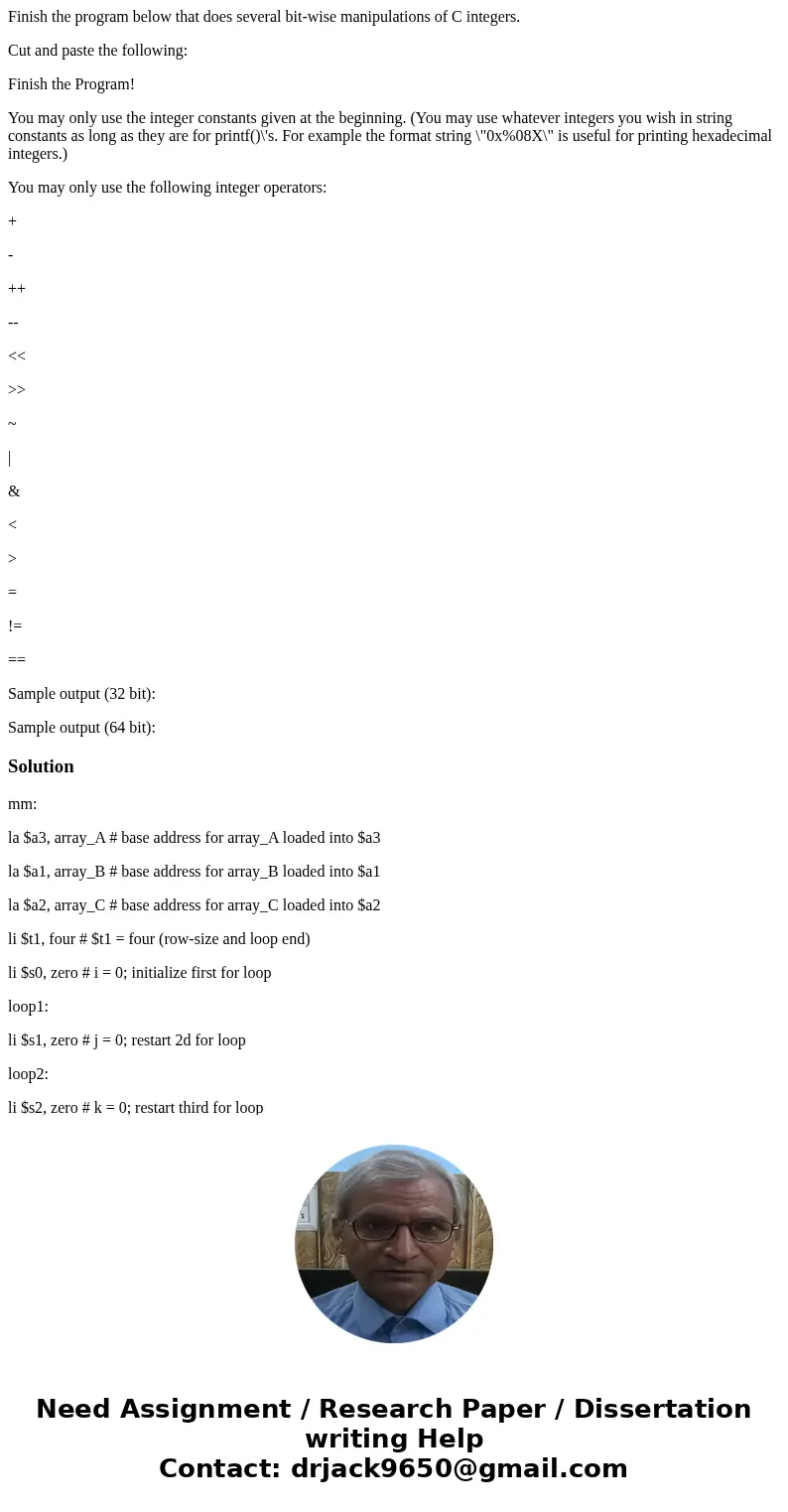
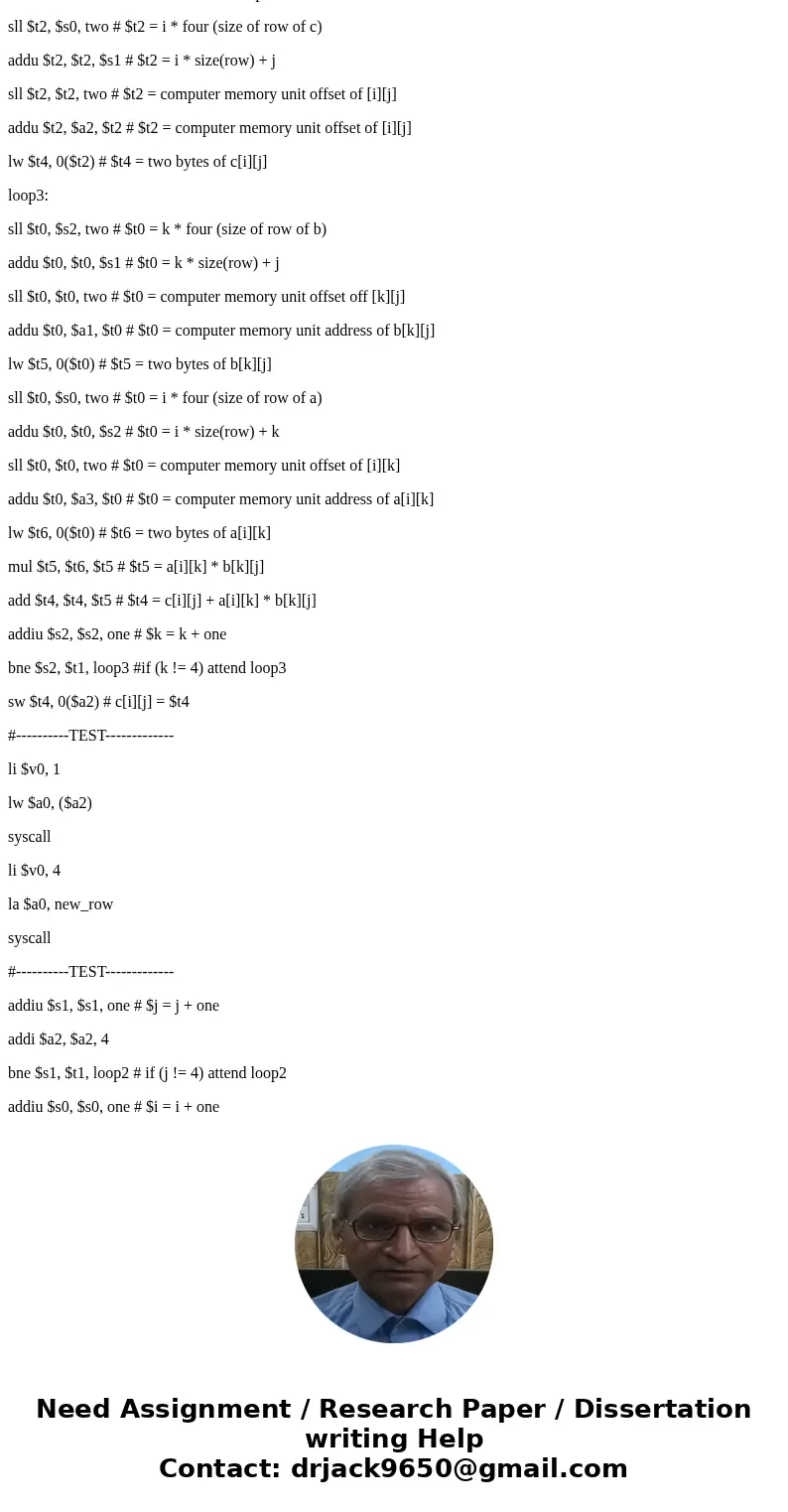
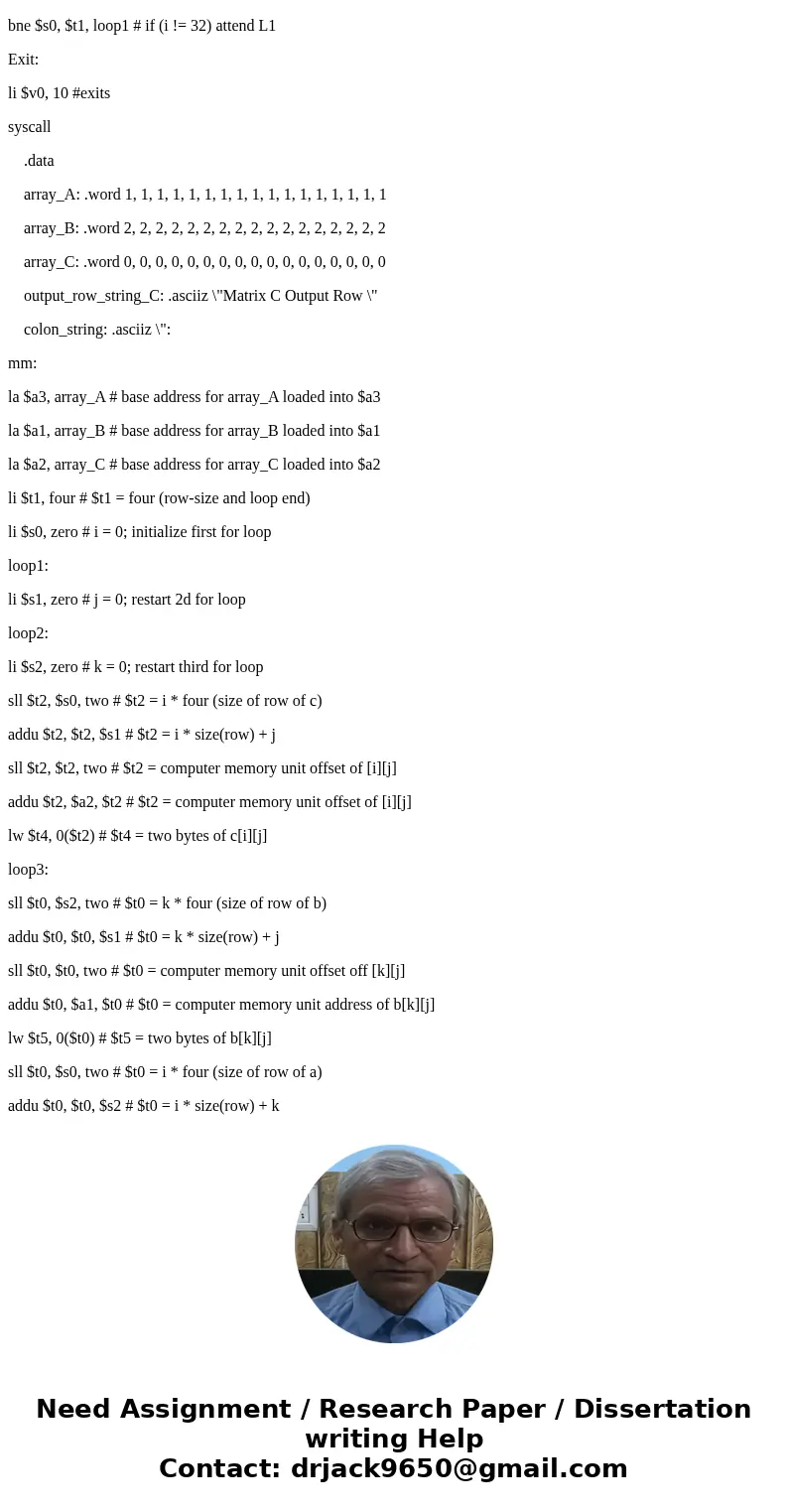
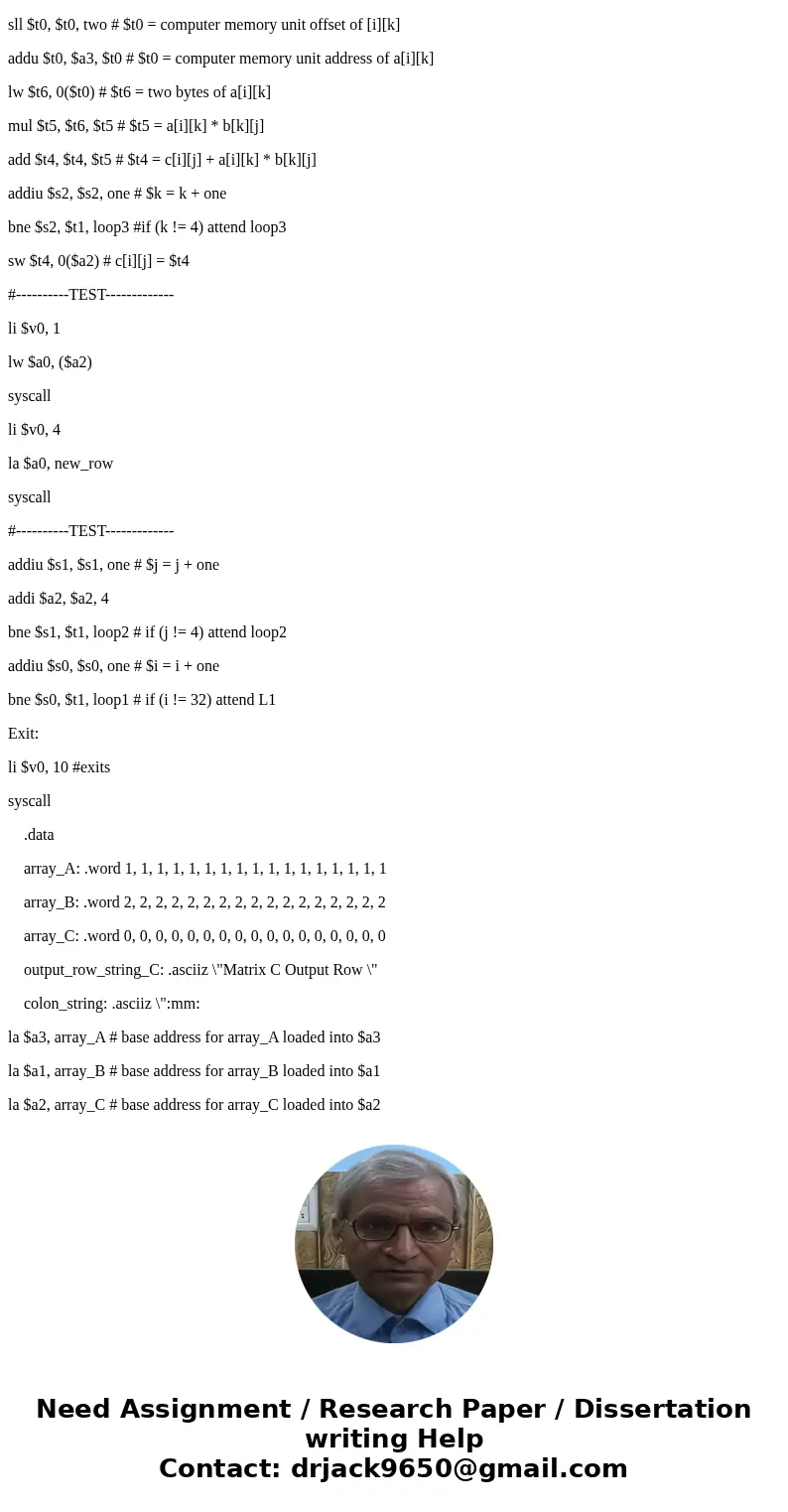
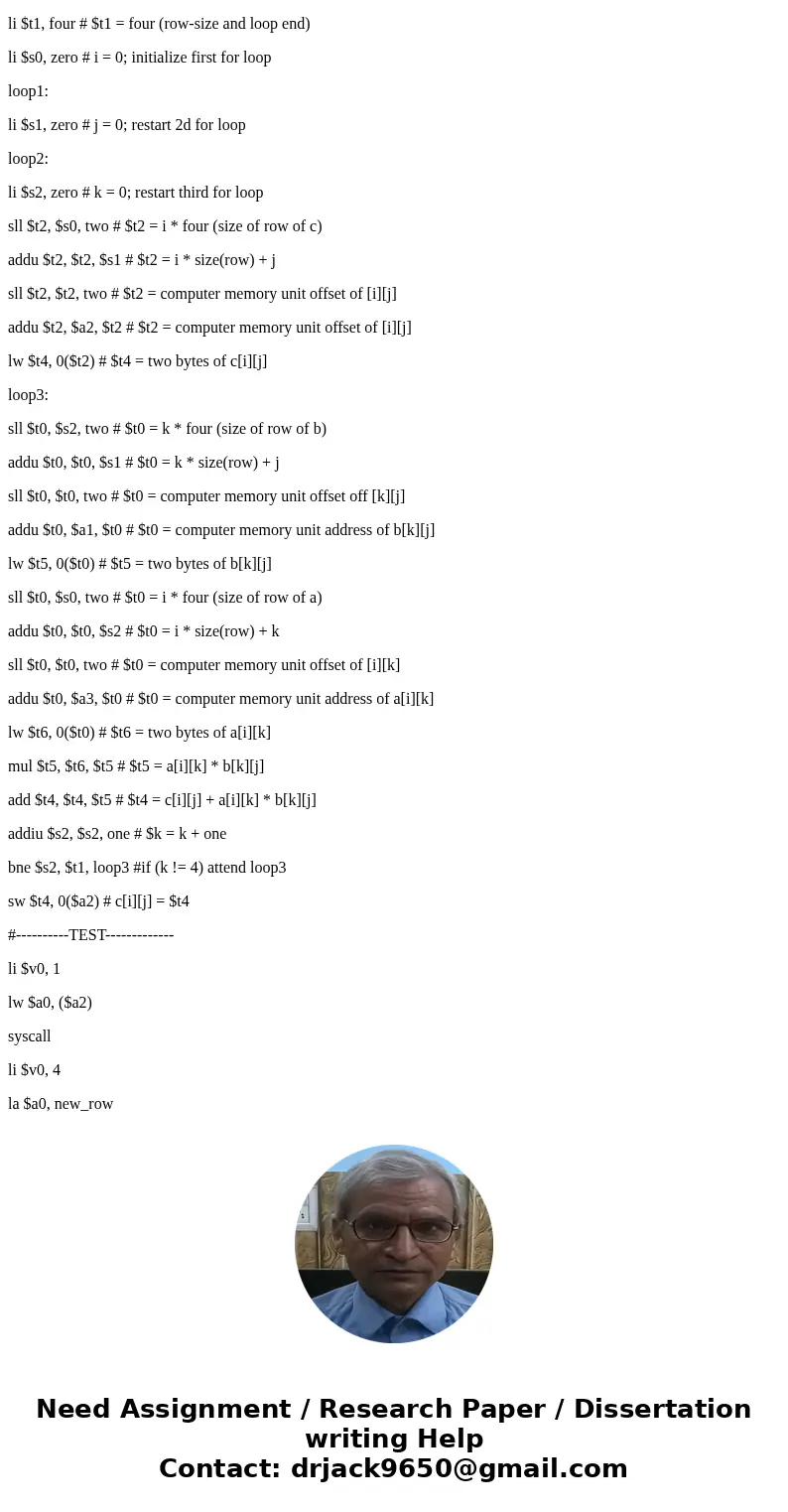
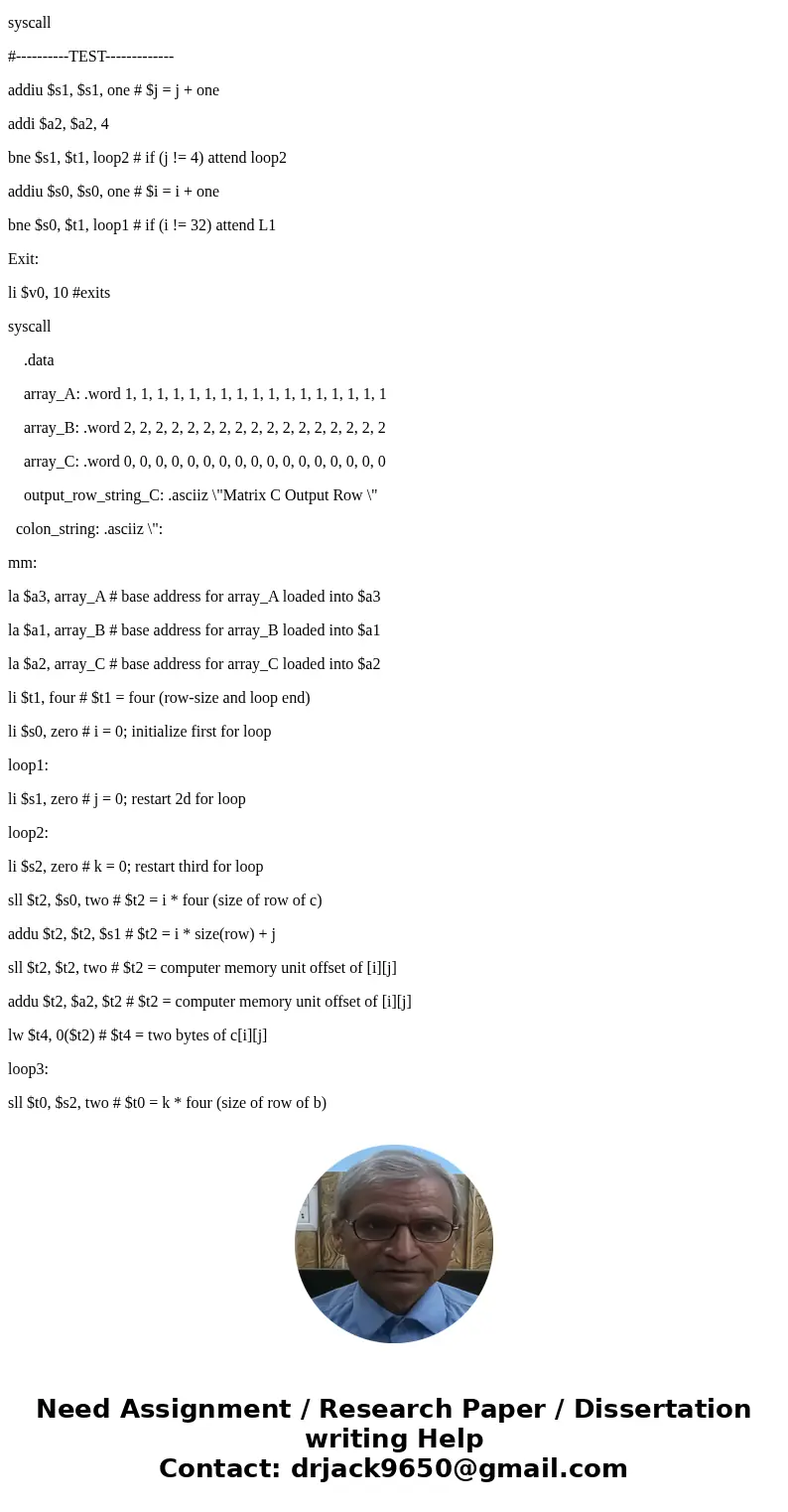
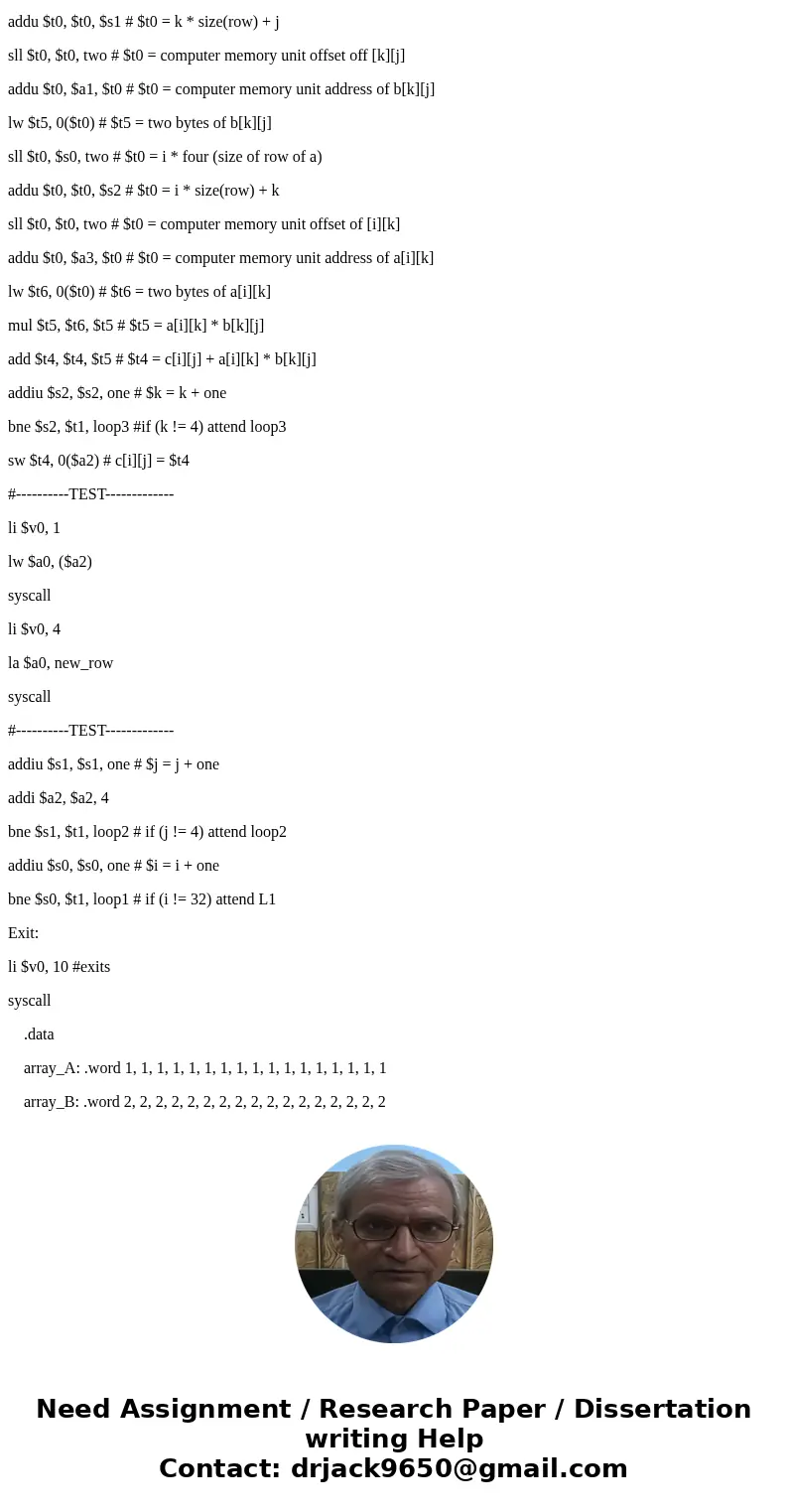
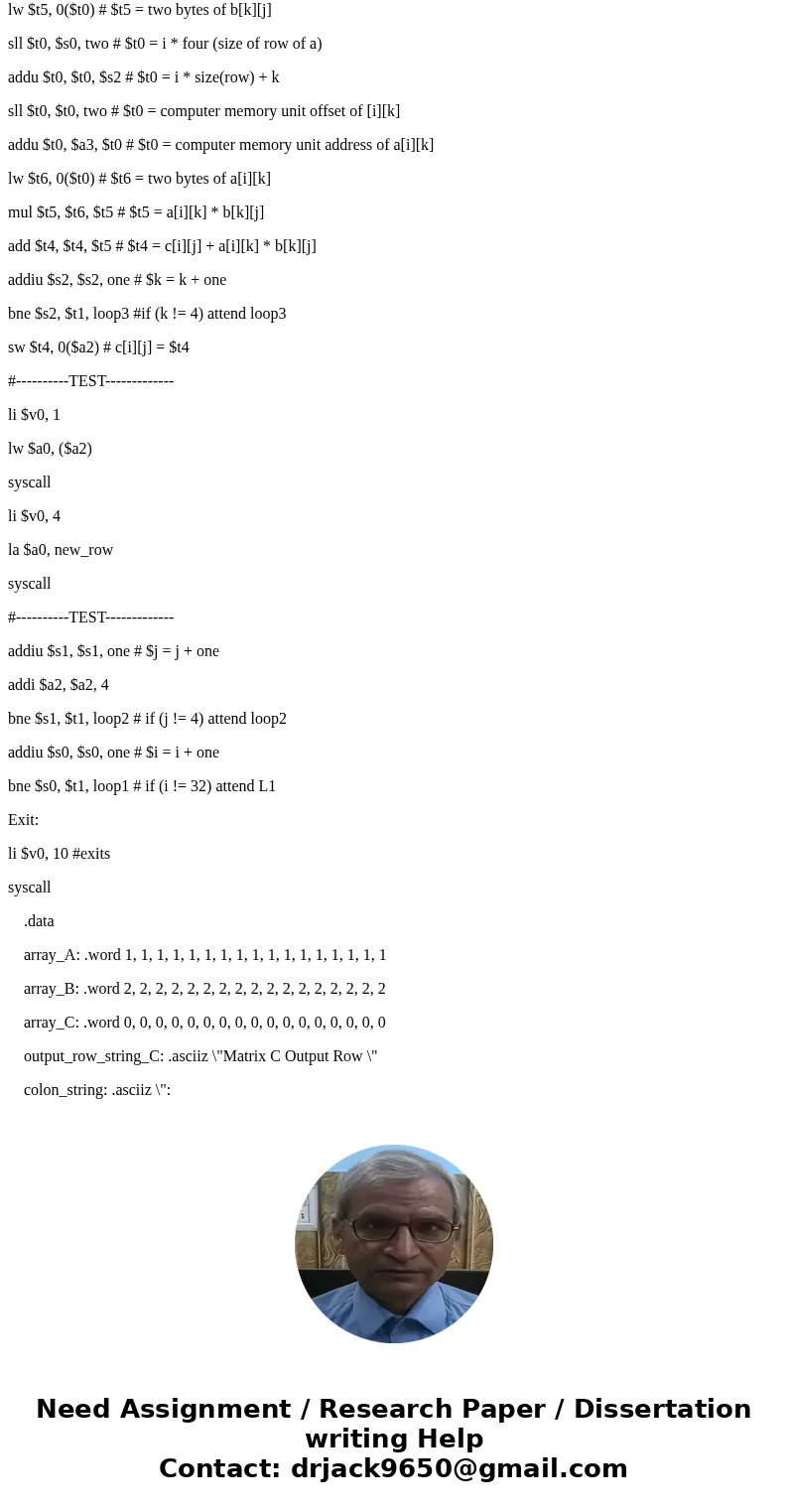
 Homework Sourse
Homework Sourse